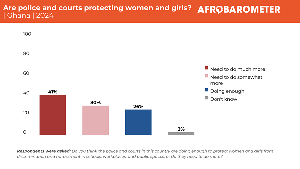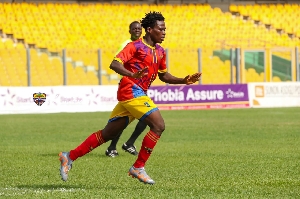A large majority of Ghanaians believe the police and courts must step up their efforts to protect women and girls from discrimination and public harassment, the latest Afrobarometer survey shows.
Only one-quarter feel that law enforcement authorities are doing enough to protect women and girls.
Findings also highlight societal challenges faced by women and girls: About one-fifth of citizens report that schoolgirls regularly experience discrimination or sexual harassment at the hands of teachers, while one-sixth say women face frequent harassment in public spaces like markets, streets, and public transport.
Smaller minorities of respondents note that women are sometimes prevented from taking up paid employment by their spouses or families and that families occasionally prioritise boys' education over girls'.
Despite these issues, the majority of Ghanaians think that women and girls are likely to be believed if they report discrimination or harassment and commend the government for doing a good job in protecting women's rights.
As Ghana joins the international community in observing 16 Days of Activism against Gender-based Violence, these data provide a timely reminder of the work still needed to ensure a safer and more equitable society for women and girls.
Key findings
1. About one in five Ghanaians (22%) say schoolgirls are "often" or "always" discriminated against, harassed, or harangued for sexual favours by teachers, while one-sixth (16%) report that women frequently experience sexual harassment in public spaces (Figure 1).
- Slightly smaller shares of the population say women are prevented from taking on paid employment by their husbands or family members (13%) and that girls are prevented from attending school because their families prioritise boys' education (12%).
2. Six in 10 Ghanaians (61%) think women and girls are likely to be believed if they complain of discrimination or harassment (Figure 2).
3. Only one-fourth (26%) of citizens say the police and courts are doing enough to protect women from discrimination and harassment in public spaces, while a large majority think these institutions need to do "somewhat more" (30%) or "much more" (41%) (Figure 3).
4. Two-thirds of respondents believe that the government is doing "fairly well" (47%) or "very well" (21%) in protecting women as a minority group, but three in 10 (29%) disagree (Figure 4).
Afrobarometer surveys
Afrobarometer is a pan-African, non-partisan survey research network that provides reliable data on African experiences and evaluations of democracy, governance, and quality of life. Nine survey rounds in up to 42 countries have been completed since 1999. Round 10 were launched in January 2024.
Afrobarometer's national partners conduct face-to-face interviews in the language of the respondent's choice.
The Afrobarometer team in Ghana, led by the Ghana Center for Democratic Development, interviewed a nationally representative sample of 2,400 adult Ghanaians in August 2024. A sample of this size yields country-level results with a margin of error of +/-2 percentage points at a 95% confidence level.
Previous surveys were conducted in Ghana in 1999, 2002, 2005, 2008, 2012, 2014, 2017, 2019, and 2022.
Charts
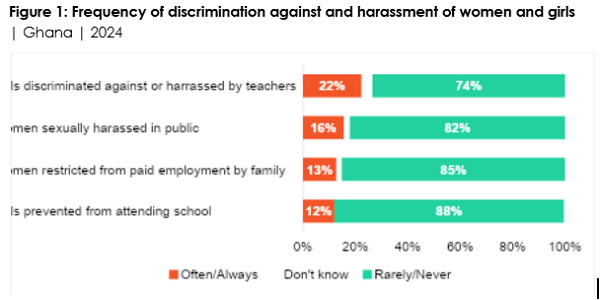
Respondents were asked: How frequently do the following things occur in your community?
Girls are prevented from attending school because their families prioritise the education of boys.
Women are prevented by their spouses or other family members from taking paid employment.
Women are sexually harassed in public spaces such as markets, on the streets, or in public transport.
Girl students face discrimination, harassment, or requests for sexual favours from their teachers.
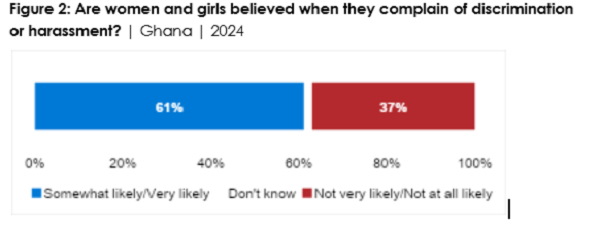
Respondents were asked: In your community, how likely is it that people will believe women or girls if they complain about being discriminated against or harassed in schools, workplaces, or other public spaces?
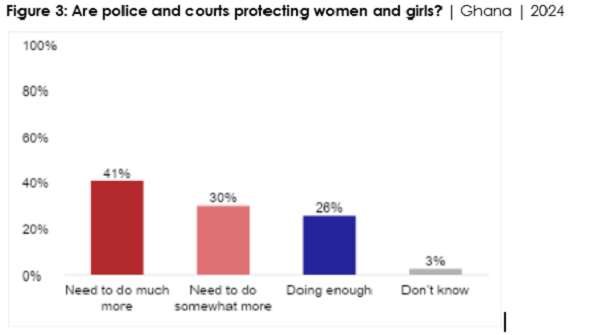
Respondents were asked: Do you think the police and courts in this country are doing enough to protect women and girls from discrimination and harassment in schools, workplaces, and public spaces, or do they need to do more?
Figure 4: Government performance in protecting women's rights | Ghana | 2024
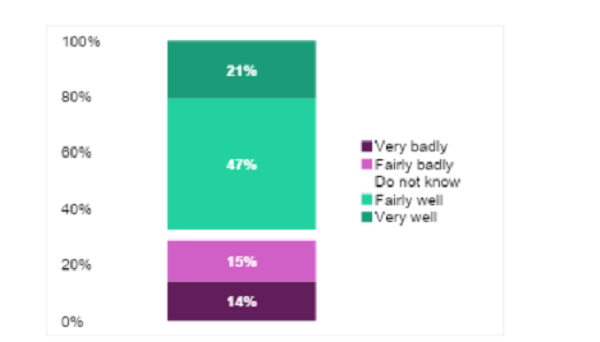
Respondents were asked: In your opinion, how well or badly would you say the government is handling the protection of the rights of the following groups against discrimination, or haven't you heard enough to say so: Women?
General News of Saturday, 30 November 2024
Source: Afrobarometer
Ghanaians demand stronger institutional protection against discrimination and harassment of women and girls
Entertainment






